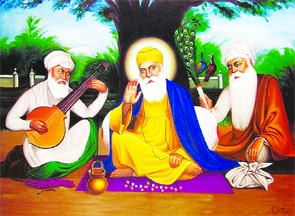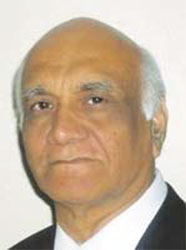

India is a land of diverse culture and traditions. Culture literally means to grow,to cultivate and nurture. It also means a way of life, behavior patterns, beliefs and value system adopted by a group of people which are generally passed on from one generation to the other generation. Anthropologist Tylor rightly said, culture is “that complex whole which includes knowledge, belief, art, morals, law, custom and any other capabilities and habits acquired by man as a member of society” (Taylor, 1). Broadly speaking culture is an expression of language, social habits, food habits, music, art and religion. Of all these Religion seems to holds a unique place in our culture. Religion is an almost universal phenomenon in all human societies, whether primitive and simple or advanced and sophisticated. Naturally, it is extremely diversified in its nature. It is an indispensable part of human individual and social life. No doubt it has been a source of comfort and solace to many but at the same time it should not be forgotten that people have been fighting in the name of religion. Etymologically, ‘religion’ means ‘to bind back’ or ‘bind together’. Therefore, it is that which binds human beings to each other in bonds of love and sympathy and also to God. Thus, it is human beings relation to that which they regard as holy, sacred, spiritual or divine. This relation between the human and Divine is manifested through the practice of Bhakti.
Concept of Bhakti
Bhakti is a devotional worship of a personal God with the aim of attaining Moksha. It is an age-old concept. We find a reference to it in the Vedas, Puranas, Upanishads, The Bhagvada- Gita, The Bhagavata Purana. In the Shvetashvatara Upanishad Bhakti simply means participation, devotion and love for any endeavor. The Bhagvada-Gitastresses the importance of having unwavering faith in God. Devotion to God is treated as supreme means of attaining moksha. A reference to this occurs in the 26th verse of the 14th chapter where the Lord says, “One who develops Unadulterated devotion, one who serves ME with utmost devotion and faith in ME. He alone is qualified to merge in Brahman because he alone has crossed the limits of the three gunas.” (Radhakrishnan, 324)
Bhakti movement
The Bhakti movement is an important event in the cultural history of India. It originated in south India during the seventh to eighth century A.D. The movement was initiated by the Nayanars (devotees of Shiva) and Alwars (devotees of Vishnu ) in the south. They preached personal devotion to God as a means of attaining Salvation. They made use of local language to spread the ideology of Bhakti. Slowly and gradually the movement spread to the north. The bhakti saints emphasized the equality of all men irrespective of caste, class and religion. They disregarded formal religion and criticized the social evils like the practice of sati, female infanticide and many more existing in the society.
Some of the saints associated with the Bhakti movement are Ramdas, Mirabai, Tulsidas, Namdev, Tukaram, Ramanuja, Kabir, Nanak and many more. However, the most significant contribution was made by Kabir and Guru Nanak. They tried to bridge the gap between the Hindus and the Muslims by borrowing ideas from the Hindu and Islamic traditions.
Guru Nanak (15 April 1469-22 September 1539)
Guru Nanak was the first Guru of the Sikhs. He propounded monotheism and combined the ideas from Hinduism and Islam. He stressed the importance of meditation on divine name to attain liberation from rebirth. His teachings are expressed through various devotional hymns. Guru Nanak had significantly contributed to the Bhakti movement of medieval India. Ever since his childhood he had witnessed the social evils prevalent in Hinduism, the inhumanity of the Hindu Caste system, the enmity between the Hindus and the Muslims and many other social problems. He was tremendously affected by all this. Also, he observed that people were confused by the conflicting messages given by pundits, priests, mullahs, etc. So, he wanted to give them the message of God. So he tried to bring about a change in the social and religious order by putting forward his own Spiritual Philosophy.
Monotheism
Firstly, he preached the truth of monotheism. There is only one God (ikonkar) who dwells in every creation. God is one and formless. He is Nirguna devoid of all attributes. He is Absolute. God is the creator, sustainer and destroyer of the Universe. God is both transcendental and immanent. He is imminent in every creation and also in Human spirit. He is merciful to all, even to the sinner. One can attain the grace of God only by practicing love and devotion with a pure heart. He used various names like Govind, Gopal, Hari, Jagadish, Thakur, Ram, Rahim, Karim and many more to refer to God. So according to Guru Nanak it does not matter much by what name we call Him, God is only One. Guru Nanak says, “There is but one God. His name is truth; he is the creator. He fears none; he is without hate. He never dies; he is beyond the cycle of births and death. He is self-illuminated. He is realized by the kindness of the true guru. He was true in the beginning; he was true when the ages commenced and has ever been true. He is also true now”. (Chandel, 118)
Naam Jap
Guru Nanak emphasized that one should keep on reciting the name of God wholeheartedly and devotedly. It should not be a mere lip service paid to God butit should be a sadhana (devotion). Reciting the name of God purifies one’s soul. He says,
“By singing the Guru’s hymns, I, the minstrel spread the lord glory. By praising the true name, I have obtained the perfect Lord”. (Chandel, 118)
Further he says:
“In the name the Lord’s Spirit abides, May the name in me be indwelling Without the Guru we walk in darkness Without the word we understand not life.” (Joshi, 75)
Guru Nanak believed that by reciting the name one can conquer one’s own ego which is the greatest devil. Human ego is the main obstacle on the way to attain salvation and there is NO other way to eliminate egoistic attitude without reciting the names of God. If a person can win over ego, that person can automatically win over lust, anger, greed, attachments and pride which are derived from ego. Also we see that Guru Nanak has stressed the importance of Guru. It is the Guru who will show us the right path.
Attitude towards other religions
Guru Nanak respected other religions and its followers too. For him, all human beings were equal and therefore one should not judge people on the basis of difference of religion.
Guru Nanak had a good understanding of the religious texts of other religions like the Vedas, Koran or the Bible and therefore equally respected them. Guru Nanak advised the Muslims and the Christians as follows “Practice within your heart the teachings of the Qur’an and the Bible; restrain the ten sensory organs for straining into evil. Tie up the demons of desire and restore faith, charity and contentment, and you shall be acceptable.” (Khushwant, 4) Thus, according to him it not only enough to read the Quran and the Bible, rather they have to follow the teachings of the Quran and the Bible in their hearts and restraint all their sensory organs.
Idol Worship
Nanak did not believe in the idol worship because God cannot be found in any idol. When people worship the idol, they forget it is to be used only as a symbol and not God itself. He holds that a man-made idol cannot be God. God is infinite, and therefore, cannot be defined by human words, symbols or idols. He is Nirguna, Nirakara and beyond all descriptions.
Spiritual Journey towards salvation
Guru Nanak’s Jap, the first hymn recorded in the Guru Granth, offers three precepts for the recognition of the Infinite One.
1. Sunia is the first step which literally signifies hearing. In the Jap it means hearkening to the divine word. It is awakening to the Transcendent Core of the universe. According to Guru Nanak, by listening to the melodious Name, one fathoms the ocean of virtue (stanza8-11, Jap). Through listening one accomplishes the knowledge of all the gods, all the continents, all the ancient texts, one learns all the techniques of meditation, one masters the expertise of all the Hindu and Muslim Sages, and through listening all suffering and distress are annihilated. The devotee who hears the Name of the ‘True One’ remain in constant bliss.
2. The second step is Mania meaning paying heed. It is, only after something is heard that full trust and confidence can be placed in it. Through faith, mind and intellect become more conscious. It is the pathway to liberation, wide open to everybody. By believing in the divine word one not only emancipates oneself from the constant bondage of birth and death but also assist in liberating one’s family and friends. As Guru Nanak believes that one’s self and society are integrally related. And the Ultimate One links each and everyone together harmoniously.
3.The third step is Mani Kita bhau which means to be full of love. It is a state of devotion state of devotion in which one goes beyond hearing the Divine Name and having faith in it. It is being drenched in love. Love is passionate and takes lovers to those depths of richness and fullness where there is freedom from all kinds of limitations and barriers. Guru Nanak and his successors explore the power of intimacy and passion in the human relationship with the Divine through the symbol of the bride who is forever seeking union with her groom.
Salvation
Guru Nanak believed that the individual soul can merge with the eternal soul only by doing good deeds. Bad deeds increase the burden of the soul and prevents it from merging with the eternal and thereby attaining liberation. Meditating on the divine name is of utmost importance for attaining salvation. Salvation is understood as freedom from rebirth and also attaining union with God. All the external aids such as idols worship, visiting temples, mosques, churches, reading scriptures, are of secondary importance and rejected. Nanak emphasized the need of a Guru as a spiritual guide for attaining salvation. A guru is a medium between a devotee and God. But a guru is neither a prophet nor a savior. God reveals the divine light to human being through the Gurus. As Guru Nanak says:
The Guru is the giver, The Guru is heaven of peace. The Guru is the lamp that lights the three worlds. (Islam, 14)
Guru Nanak believed in the Unity of God or one God which is known by different names. God has created all human beings. So, all human beings are equal, irrespective of the diversity of caste, class, religion, belief, color, sex, and race. The entire humanity can be regarded as one family because we all come from the same source. He emphasized the universal brotherhood. So according to him, the best way to serve God is to serve humanity. Also, the recitation of the “naam” or name of God with utmost devotion is essential for all. In brief, Guru Nanak stated his concept of God in the following manner: “There is one God His name is truth, He is the creator He is without fear and without halt. He is beyond time immortal; His spirit pervades the universe. He is not born, Nor does He die to be born again, He is self – existent By the guru’s grace shalt though worship Him” (Chandel, 118). According to him there is no escape from Karma. Everyone has to work and perform good deeds. Only then one can attain salvation and reach God. This can be best exemplified through his own life. He did not believe in any kind of asceticism. He had a family and still served humanity actively. In his teachings he incorporated ideas both from Hinduism and Islam. So, he had followers from both faiths. When Nanak was nearing death, the Muslims said: ‘We shall bury him’ and the Hindus said, ‘We shall cremate him’. To this Guru Nanak said: ‘You place flowers on either side, Hindus on my right, Muslims on my left. Those whose flowers remain fresh tomorrow will have their way.’ (Khushwant, 37) Then the people started praying for him. In the following morning, the body of Guru Nanak was missing but flowers kept on both the sides were fresh. His death also represents his long-cherished endeavor to promote communal harmony among the people. He travelled to different places which gave him a fair idea of the problems existing in the society like exploitation, poverty, superstition, caste system and the miserable conditions of the women. He felt the need to liberate people from the evils existing in society. He believed that human dignity should be upheld. He also opposed the sati system prevalent in society and tried to give equal status to the women. Thus, Guru Nanak’s approach was very practical and rational. Travelling to various parts of India he spread the message of love, harmony and brotherhood. His teachings encouraged people to live a better life. In fact, he was a religious and social reformer who understood the problems of the people and tried to solve them.
(Anupama Mujumdar is an Associate Professor at Department of Philosophy D. G. Ruparel College, Mumbai, India)





Be the first to comment